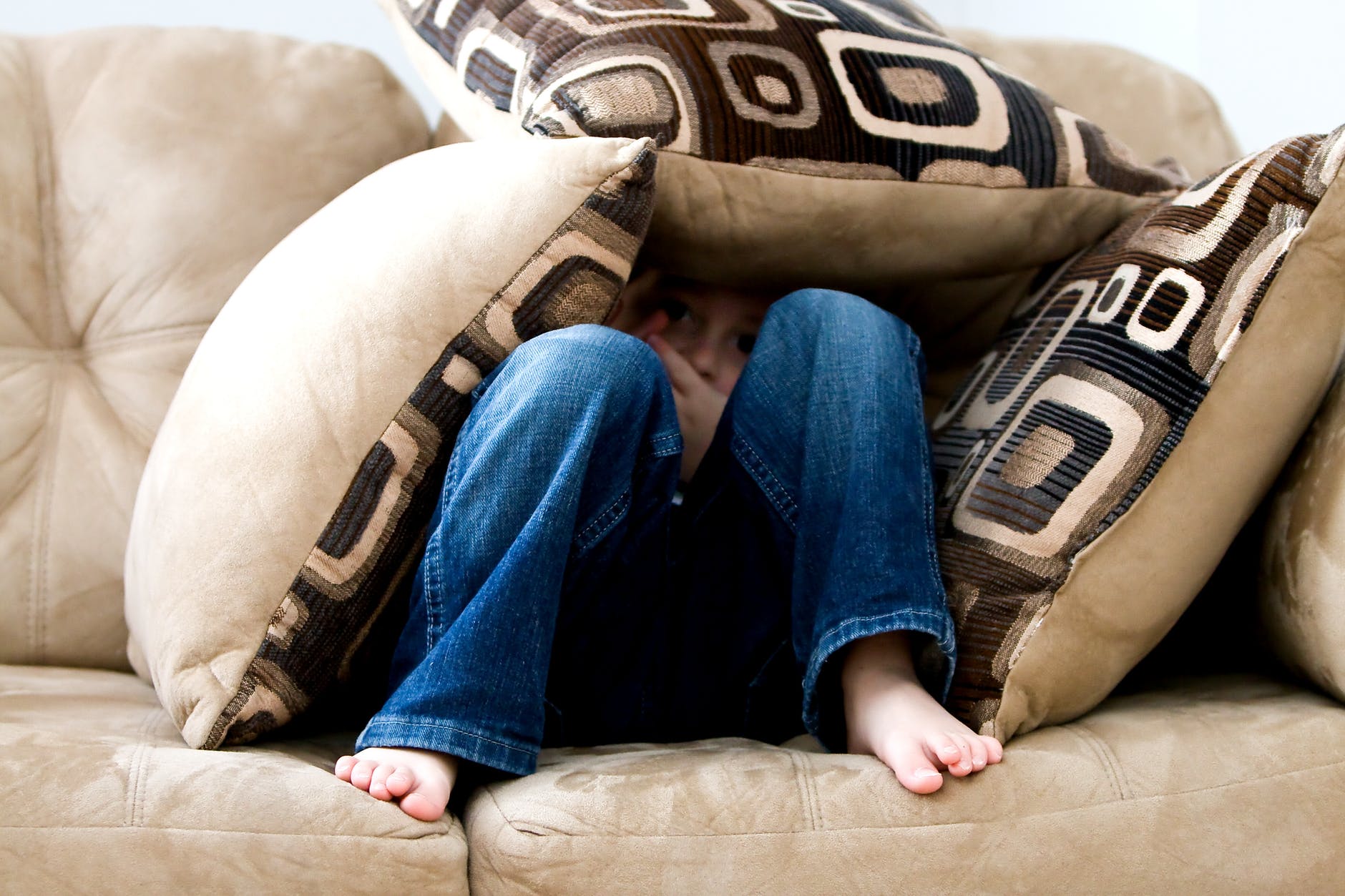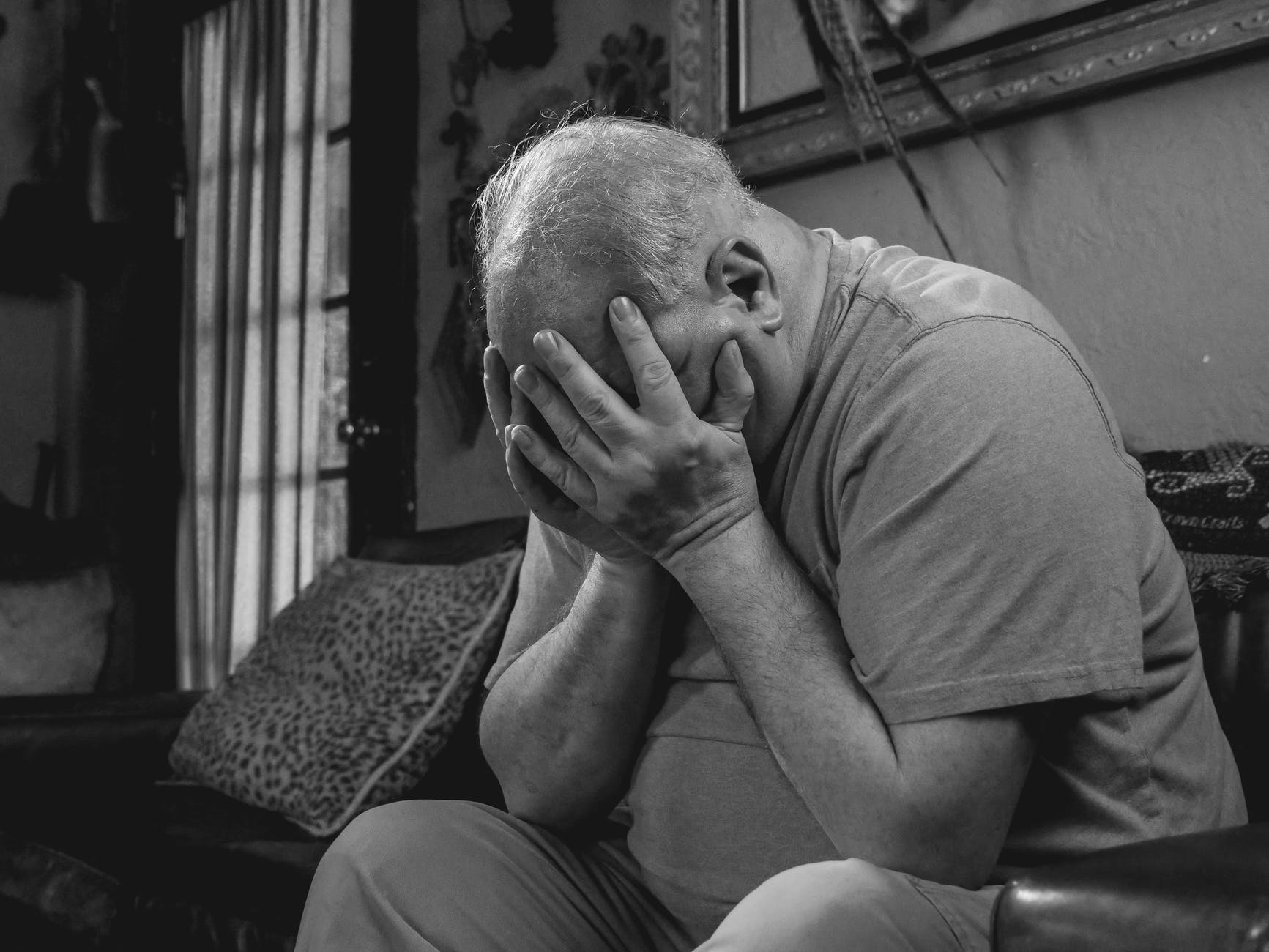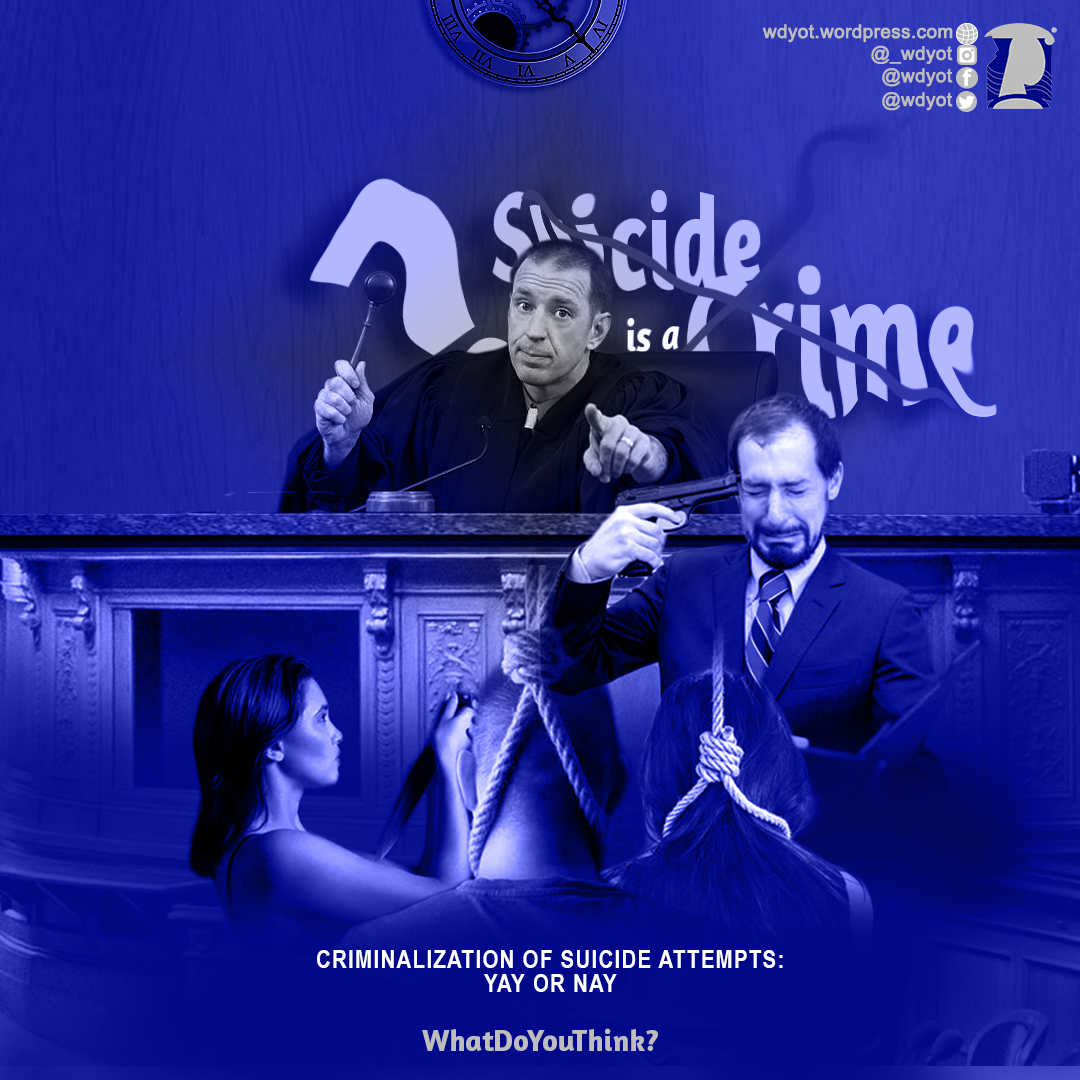Society employs numerous strategies in protecting its ideal of the sanctity of life. These include legislation, like Section 327 of the Criminal Code Act of the Nigerian constitution, which states that “Any person who attempts to kill himself is guilty of a misdemeanor, and is liable to imprisonment for one year.” Similarly, Section 231 of the Penal Code Act provides that “whoever attempts to commit suicide and does any act towards the commission of such offence, shall be punished with imprisonment for a term which may extend to one year or with fine or with both.”
What defines suicide? Suicide is “the act of killing oneself intentionally.” Now, while the law can afford some protection for a person from other persons, can the law protect a person from his own self? The Criminalization of Suicide Attempts raises many such controversial questions.
Now, while the law can afford some protection for a person from other persons, can the law protect a person from his own self?
WHY WOULD ANYONE WANT TO END THEIR OWN LIFE?
First off, “Why would anyone want to take their own life?” After all, it is commonly said that one human life is more precious than all the treasures in the world put together. A homicide might be considered different from a suicide because, with a homicide, that treasure being stolen, whereas a suicide is tantamount to a man tossing the treasure off with his own hands.
Life is indeed precious, but it is beyond Biology- birth, and the eventual death that ends it all. Rather, life is a complex multifactorial phenomenon with numerous ramifications. Should the delicate harmony of these be tampered with, a man might conclude his only option is to hit the red button. Once and for all.
YEAH… IT’S YOURS, RIGHT? BUT YOU CAN’T TAKE IT.
Unfortunately, that contravenes the societal ideal of the sanctity of life, and it(the Society) can not but respond when “suicide rates have increased by 60% over the last 45 years, thus constituting a major public health burden”(Alabi et al, 2014). The World Health Organization (WHO) estimates that 400,000 people commit suicide yearly. That’s roughly one suicide every four seconds! As of 2019, 77% of all suicide attempts occur in low and middle-income countries.
The World Health Organization (WHO) estimates that 400,000 people commit suicide yearly. That’s roughly one suicide every four seconds!
WHO
NIGERIA AND SUICIDES FOR INSTANCE
Nigeria sits kingly in this rank of low and middle-income countries. Nigeria ranks first in Africa and is also highly ranked globally by suicide attempts. No surprises there since 3.9% of Nigerians suffer from depression, again the highest incidence in Africa (WHO, 2017).
The correlation evidences findings that depression is a major cause of suicide, and anything triggering depression can lead to suicide. Poverty, loss (of loved ones or properties), broken relationships, academic frustration (a study links more than half of suicide attempts to students), are all risk factors.
CRIMINALIZATION OF SUICIDE ATTEMPTS: THE ANTI-SUICIDE LAWS
A stage being established for the legislation and the need for it, the next controversy is: does it work? There is no clear evidence that criminalizing suicide attempts has been an effective deterrent.
MAYBE ANTI-SUICIDE LAWS WORK?
Maybe a positive perspective can be taken, at least. There are as many people alive for fear of dying, as there are people dead because they are afraid of living. As the fear of death can serve as a deterrent from suicide attempts, so can the fear of a penalty, should the attempt fail.

Dr. Caroline Ekpendu’s paper also presents some arguments in favor of the legislation. One is based on religion (sin and the belief in God as the sole authority on life). Others are based on cultural beliefs and ethnicities upheld over the centuries.
There are as many people alive for fear of dying, as there are people dead because they are afraid of living.
ACTUALLY, ANTI-SUICIDE LAWS DON’T SEEM TO WORK. HERE’S WHY!
1. A blind eye for an eye?
But is this legislation justified? In the words of Rev. Joseph Fiorenza, “We oppose the death penalty [because] it offers the tragic illusion that we can defend life by taking life.” The legal system punishes some offenders by taking their lives. Yet, this same system seeks to preserve other lives by some other punishment. It is an interesting irony indeed. However, the subject here is not the morality of the capital punishment.
2. I won’t tell if you don’t tell, save us the trouble

One other argument against criminalizing suicide attempts is that the legislation makes it difficult to report cases. With the shame and stigma already associated with suicide attempts, what happens when the fear of impending legal action is coupled? In the world over, and particularly in a society like Nigeria, suicide attempts go unreported for fear of the law. Friends and family would rather report the incidence as an accident to protect the collective interests of themselves and the offender. How then do the arms of the law hope to grasp such an offender if no one points him out? In this scenario, the law has only shot itself in the leg.
Suicide rates compared five years before and after abolishing suicide laws in seven certain countries (Canada, England, Wales, Hong Kong, Ireland, New Zealand, and Sweden) showed an increase in suicide rates. Does that mean the laws should have been upheld since it appeared suicide rates were lower when they were still in place? Actually, no. Suicide rates didn’t necessarily increase, rather the number of reported cases increased. People could report cases without fear of punishment.
3. I need help, but I can’t ask
Suicide is in three stages: Suicide Ideation, Suicide Planning, and Suicide Attempt. If a person was only in the Suicide Ideation stage, it might be a different case. However, once the Suicide Planning Stage has been surpassed and the first Suicide Attempt has been made, it becomes more difficult for such a person to come out. In fact, they could persuade friends and families and pretend under the guise of “I’m okay now.” They are afraid of the truth getting out and having to face the wrath of the law, coupled with the societal stigma. The law has, therefore, contributed to denying these citizens access to the barely-available mental health care they desperately need.
4. You can’t stop me from trying again
Azcarate-Jimenez et al (2019) published a research involving a certain set of suicide attempters, which showed that 14% of them tried to take their own lives again at least once within six months of the first attempt, and 7% of those eventually succeeded. Some argue that people who attempt suicide are best kept in prison to prevent scenarios like these. Yet, suicides happen in prisons frequently enough to negate this argument. The rate of Prisoner Suicides in the United States is four times higher than among the general population (Wikipedia).
…14% of them tried to take their own lives again at least once within six months of the first attempt, and 7% of those eventually succeeded.
5. Suicide attempt or Deliberate Self-Harm(DSH): is there a difference, really?
Here is a good point to broaden the scope to include self-inflicted injury and acts of deliberate self-harm (DSH). What is a suicide attempt exactly? A certain man in prison bruised his head against a wall, claiming he intended suicide. Though this is DSH, it barely qualifies as a suicide attempt. So, should the legal system put him on trial for attempted suicide according to his word? It goes to show that what qualifies as a suicide attempt is only vaguely defined. Why then should justice operate on such obscure grounds? Without clarifying this definition, then all acts of DSH would be unjustly subjected to trial.
6. I’ll fall so fast you could never catch me
On critical consideration, mere legislation cannot stop a so-determined man from taking his own life. What happens when a man holds a knife to his belly with the knowledge of the legal repercussions of what he is about to do and knowing he only has to face such penalties if, and only if, the attempt fails? He will not risk failing to come back to face repercussions. Thus, rather than serving as a deterrent, that law only makes him more dogged in executing the act successfully. He would take a greater dosage of the poisonous substance, look for a larger body of water to drown in, a greater height to jump down from, a sharper knife, etc. He would shut his door tighter or go to more isolated places to ensure he is not discovered till the deed is done. He wouldn’t have to come back to face any repercussions.
7. Let me speak for myself

Perhaps the best argument is the experience of Ifeanyi Ugokwe, as covered by Busari S. (2018). Poverty sent Ugokwe shambling into a lagoon in Lagos State, Nigeria. Luckily, or not, he was rescued by local fishermen, and there his predicament began. He narrates his ordeal thus:
“The worst part of it was [that] they locked me in a cell with crazy people [who were] talking to themselves and jumping around… I was beaten and forced to take pills that made me [only want to] sleep and eat.”
Interestingly, Ugokwe was not aware anti-suicide laws existed. The poor awareness of this legislation questions its efficacy because even the terror management effect it exerts is negated.
Oneyemelukwe, a health law expert combating suicide laws, describes the legal process as inhumane. The offenders, seeing no reason for their trial and imprisonment, toss all remaining hope. Ugokwe confirmed that all he needed was love, not punishment. Without appropriate attention, rest assured that the Ugokwes will try again, and they will try harder.
A SATELLITE SHOT – SUICIDE LAWS BEYOND NIGERIA
Beyond Nigeria, how have suicide laws fared? Most countries that had these laws have either reviewed or outright discarded them, like Canada, India, and Pakistan. They now regard suicide attempters as patients, not criminals. However, certain African countries still uphold them. In Nigeria, it is a carryover from the precolonial era, although Britain herself abolished suicide laws in 1961 (post-independence).
…regard suicide attempters as patients, not criminals.
AWAY WITH THE SUICIDE LAWS
What then would be the escape from this quandary? The readily obvious is to decriminalize suicide. That legislation needs to go! Comparing suicide rates ten years before and after decriminalization in Canada showed no change, proving that the law was never effective.
The Nigerian government has made commendable efforts to ban the insecticide Sniper, a popular exit route for suicidal Nigerians. However, more must be done on enforcement, as this lethal last supper wine still finds its way into throats thirsting for it.
Furthermore, there should be empowerment and employment so people are not sent to suicide by poverty. Oppressive educational administrators and systems should be eliminated to avoid frustrating students (a man chose suicide due to a twenty-year stagnation in his Ph.D. program!).
Importantly, there should be support systems. Nigeria, for instance, has barely three hundred Psychiatrists, a drop in the ocean of over two hundred million citizens. Therefore, support systems consisting, not only of the professionals, but also friends, families, and communities should be established.

Finally, mental health advocacy, reforms, resilience training, and promotion of emotional well-being must be provided, with a focus on the youth among whom suicide is prevalent.
REFERENCES:
1.Alabi, O.O. et al. “Suicide And Suicidal Behaviours In Nigeria: A Review,” https://www.researchgate.net/publication/271748010 , November 2014.
2. Akinremi, Rebecca. “Nigeria has highest suicide rate in Africa, sixth globally” www.icmnigeria.org/nigeria-has-highest-suicide-rate-in-africa-sixth-globally , September 2019
3. Ekpendu, Caroline, LLB (Uni Ben); LLM, PhD (BSU). “The Nigerian Law On Suicide: A Tragic Response To A Cry For Help.”
4.“Prisoner Suicide,” , https://en.m.wikipedia.org/wiki/Prisoner_suicide
5.Busari, Stephanie. “Locked up for trying to take his own life, in a country where it’s a crime to attempt suicide,” CNN, https://edition.cnn.com/2018/12/30/health/imprisoned-suicide-illegal-intl/index.html , December 2018.
6.Azcarete-Jimenez, L., Lopez-Goni, J.J., Goni-Sarries, A., et al. “Repeated suicide attempts: a follow-up study”, PubMed, https://pubmed.ncbi.nlm.nih.gov/31461152/ , 2019


This was really helpful
LikeLike